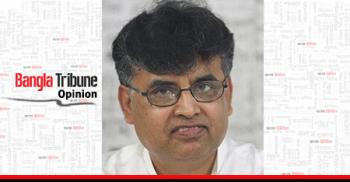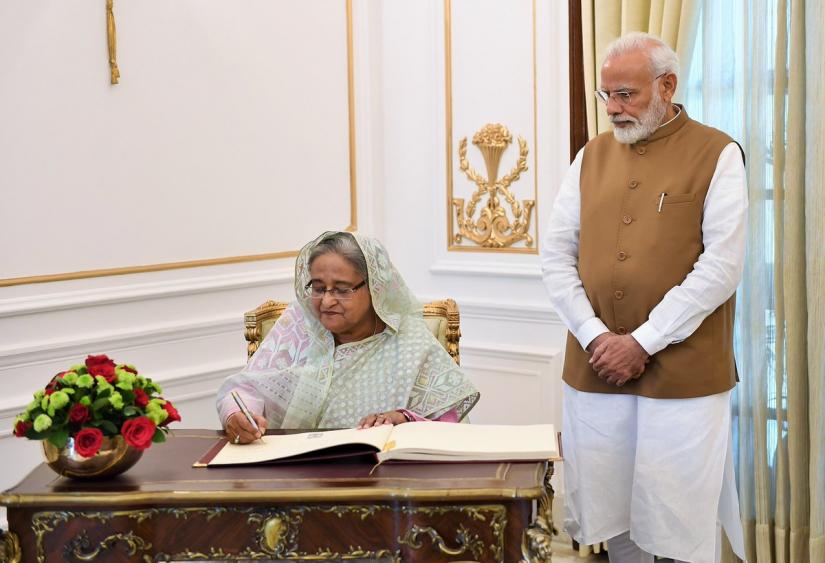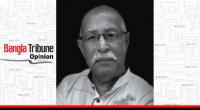 We can analyse Sheikh Hasina's Delhi visit in two different ways. Firstly, Bangladesh joining the World Economic Forum Summit 2019 in India, with the prime minister as a chief guest. Secondly, it was a short bilateral visit in India, of which, the first part turned out as more significant. Sections of Indian bureaucracy and the civil society fear that China is playing more cards in Bangladesh. But joining as a chief guest in the World Economic Forum Summit 2019 in India, organized by the Indian industrialists and business groups, it sends a signal to the Indian businessmen. It was an assurance to Indian businessmen that Bangladesh is not a place where only Chinese players will play their cards; it is a place, where anyone can do business if they qualify, be it Indian, Japanese, Korean or Chinese.
We can analyse Sheikh Hasina's Delhi visit in two different ways. Firstly, Bangladesh joining the World Economic Forum Summit 2019 in India, with the prime minister as a chief guest. Secondly, it was a short bilateral visit in India, of which, the first part turned out as more significant. Sections of Indian bureaucracy and the civil society fear that China is playing more cards in Bangladesh. But joining as a chief guest in the World Economic Forum Summit 2019 in India, organized by the Indian industrialists and business groups, it sends a signal to the Indian businessmen. It was an assurance to Indian businessmen that Bangladesh is not a place where only Chinese players will play their cards; it is a place, where anyone can do business if they qualify, be it Indian, Japanese, Korean or Chinese.
In that economic summit, the president of the World Economic Forum said, "21st century is dramatic and pervasive transformation and a shift from unipolarity towards multipolarity …." No doubt, the economy of South Asia is taking a multipolar shape. Once, the economy of South Asia was unipolar with India as its centre. With time, it has changed. Though not bigger like India, now Bangladesh is also a centre of South Asian economy for its faster growth, geopolitical situation and having a big internal market. Its far Eastern neighbour is the fastest growing economy of the world, China, and its closest neighbour is a powerful economy of South Asia, India. But both these countries cannot ignore the economy of Bangladesh which is a facilitator of these two bigger economies.
In these circumstances, Sheikh Hasina’s joining the economic summit was most important for Indian business. Like China, India is also looking at many African states for their investment. But Bangladesh is more lucrative to Indian businessmen than Africa. Bangladesh is politically and socially more stable than any of the African countries.
Besides, in Bangladesh, at least 10 million young workers are ready to build up versatile kind of industries. The young women workforce of Bangladesh has already shown its ability in the garments sector. Now, Bangladesh is in the second position for exporting ready-made garments. We know that Vietnam and Cambodia are doing very well in much labour-intensive export-oriented industries like shoes, toys, furniture, and electronic devices. If the Bangladeshi young workforce gets a chance to produce those products, Bangladesh may surpass those countries. They will do better in the software sector. Indian industrialists have both the technology and expertise with running capital. They also know there is much more to explore in those sectors in Bangladesh than in Africa. They are only afraid of China but Sheikh Hasina's joining this summit gave Indian business more confidence to think of a long-run investment in these sectors along with others.
The president of the World Economic Forum delivered his speech stressing the Indian economic perspective. He spoke of future infrastructure which will be built, such as, infrastructure development in Afghanistan, the international north-south transport corridor, the ‘Chabahar' port and the India-Myanmar-Thailand highway. Even the BRICS Bank and others are talking about these. He also mentioned the multipolarity of the economy.
South Asia will also take a multipolar shape, and then the massive infrastructure will not only help the Indian economy but also accelerate the entire south Asian economy, especially, the economy of India's neighbour and the faster economic growth country, Bangladesh. Dhaka will link up with ‘Chabahar' port and the Myanmar-Thailand highway or even with the Afghanistan infrastructure. Indian businessmen investing in Bangladesh can be a part of it too.
Through this economic summit, Sheikh Hasina gave that signal to the Indian business houses. Now, the ball is in their court and the result depends on how they will play. The second part of Sheikh Hasina's visit was one day's India and Bangladesh bilateral visit. So far we know Sheikh Hasina did not agree to this bilateral visit at first. However, she agreed later but insisting on more concessions from her counterpart. It was a very short working visit. The two countries signed seven agreements, most of them are cultural and educational. Among them, two are important. One, the joint surveillance in the coastal area, which is necessary for protecting fish and resisting terrorists and arms smuggling, and the second one is that Indian state Tripura will get 1.80 cusec water from the Feni River, to help meet their peoples’ urgent drinking requirements. People have been suffering for a long time for drinking water as the underground water of the total area is arsenic affected and they have no surface water.
The second part of Sheikh Hasina's visit was one day's India and Bangladesh bilateral visit. So far we know Sheikh Hasina did not agree to this bilateral visit at first. However, she agreed later but insisting on more concessions from her counterpart. It was a very short working visit. The two countries signed seven agreements, most of them are cultural and educational. Among them, two are important. One, the joint surveillance in the coastal area, which is necessary for protecting fish and resisting terrorists and arms smuggling, and the second one is that Indian state Tripura will get 1.80 cusec water from the Feni River, to help meet their peoples’ urgent drinking requirements. People have been suffering for a long time for drinking water as the underground water of the total area is arsenic affected and they have no surface water.
For this humanitarian cause, Sheikh Hasina, the mother of humanity has given them the opportunity to withdraw this surface water. Now, the ball is again in India's court. A huge number of people living along the bank of the Teesta River in Bangladesh have been suffering for a long time every summer from a shortage in their drinking water and food grain cultivation needs. But India is always saying that West Bengal's Chief Minister's irrational position is the main cause which stops them from signing a treaty with Bangladesh regarding Teesta River water.
It is not the duty of Bangladesh to convince or pressurize the Chief Minister of West Bengal to make her understand the reality. It is the duty of the Indian Central Government, and after the Feni river agreement, the Teesta river water sharing agreement becomes a holy duty for the Indian Central Government. Sheikh Hasina has played a great diplomatic card in a humanitarian way like her father. Now, Mr Narendra Modi has to prove his ability to respond to Sheikh Hasina's gambit. Even though her short working visit, Sheikh Hasina has once more shown her charismatic diplomacy.
A state award-winning journalist, Swadesh Roy can be reached at [email protected].


